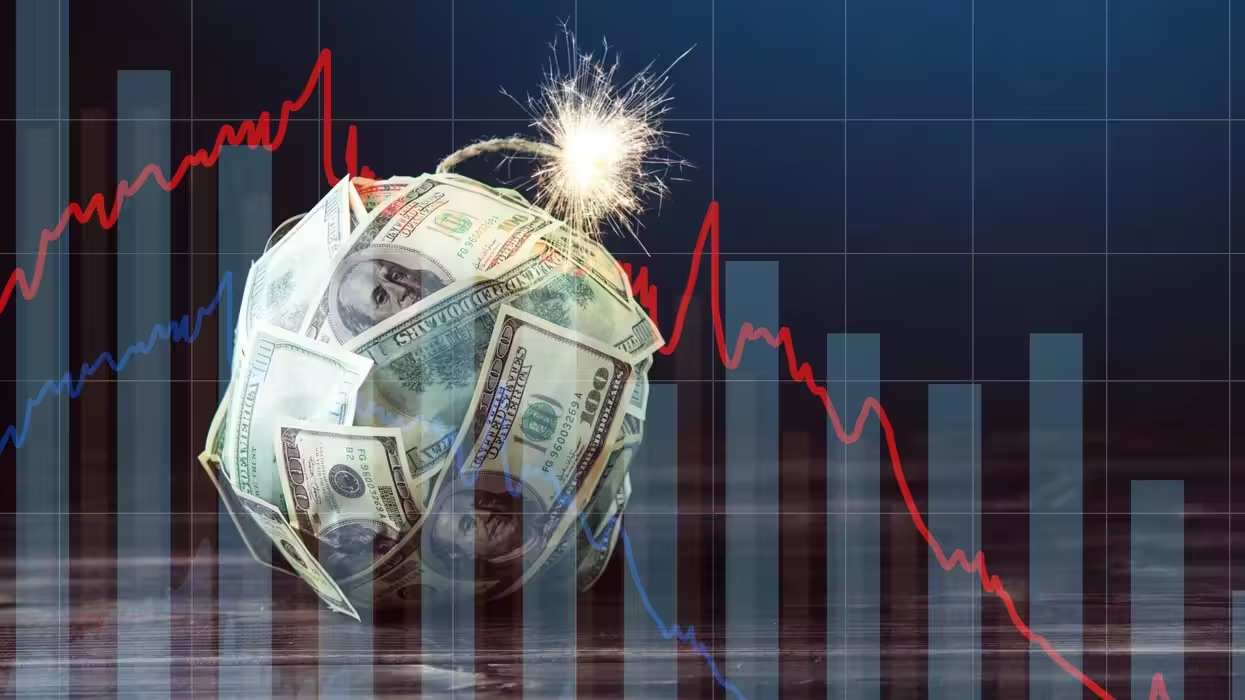
© 2026 Blaze Media LLC. All rights reserved.
How Alexander Hamilton and his First Bank of the U.S. paved the way for the 2008 financial crisis
February 16, 2015
Political corruption + big government = calamity.
Author Jay Cost of The Weekly Standard has a new book out titled "A Republic No More: Big Government and the Rise of American Political Corruption," in which he presents an extensive history of how the federal government came to promote private interests over the public good -- corrupting the Republic to an ever-greater degree as government expanded beyond its Constitutional bounds.
This corruption in Cost's reading dates back to Alexander Hamilton's First Bank of the United States -- a national bank that James Madison likely never envisioned when drafting the Federalist Papers with Hamilton -- that used its position to buy off members of Congress. This government-sponsored entity would pave the way not only for endemic and systematized corruption, but future financial calamities including the 2008 crisis, precipitated in part by a Fannie Mae and Freddie Mac similarly enabled by Congress, and which used its advantages to buy Congress off.
As Cost explained:
We did not build institutions to manage a GSE like the First Bank [of the U.S.] successfully....It's created by Congress, and Congress simply...lacked the capacity to keep the GSE [government-sponsored enterprise] under control. And what happens?
Well, Jefferson and Madison are good friends with the first clerk of the House of Representatives, and he keeps a list: here are the members of Congress who own bank shares. And here are the members of Congress who have insider information and have been supplied insider information by the bank itself.
And Jefferson writes to Washington and says, "Look, if there were an honest up or down vote on the bank itself, it would lose. The only reason it is still around is because enough members of Congress have been bought off."
And that's the problem with it...it [the bank] was created by the government, but then it turned around to lobby it.
Madison in a letter to Jefferson...talked about the shareholders of the bank -- they called them "stockjobbers." He writes: "The stockjobbers will become the praetorian band of the government, at once its tool and its tyrant, bribed by its largesses, and overawing it by clamors and combinations."
What he means by that is that the government created the bank, and the government made the bank -- the people who held bank shares -- were better off because of...the government's action. And they turned around and they used some of the benefits...gave it back to members of Congress effectively to buy them off.
So how does this relate to Fannie Mae, Freddie Mac, and the financial crisis of 2008?
[instory-book ISBN="9781594037276"]
[Fannie Mae and Freddie Mac are similarly] private institutions with public charters. And they have the implicit bank backing of the United States government. Investors in Fannie and Freddie believe that if they got into trouble, the federal government would bail them out...And that enabled the GSEs -- that enabled Fannie and Freddie -- to borrow money at substantially lower rates, and effectively corner the secondary mortgage market....They were able to do this at a cut rate price because of this federal subsidy [valued by the CBO at around $10 billion]...the benefit to Fannie and Freddie for their federal charter. But they only turned a portion of this subsidy back over to the consumers in the form of lower mortgage rates. They kept the rest of it for themselves, and so the executives of Fannie and Freddie were able to collect jaw-droppingly large bonuses.
But more importantly for the purposes of my story about corruption...all it took was just a tiny fraction of this $10 billion subsidy, plow it back into the political process through campaign contributions, through an extensive lobbying network, through strategic charitable giving...They would open offices, regional offices, in states and Congressional districts, and they would hire the the relatives and friends of members of Congress. They were able to do all of this because of their federal subsidy.
And what did all of this lobbying buy them? It bought them freedom to do whatever the heck they wanted.
...Any other company would have been ruined for that...After the Enron accounting scandal came out, Freddie Mac had an independent outside auditor look at its books because they were using Arthur Andersen as their auditor, and it came back that Fannie and Freddie were in disastrous shape financially, or at least their books were disastrous. And all of this sort of stuff that Enron was doing, Fannie and Freddie were doing a lot of that as well.
And look what happened in the wake of the Enron scandal...We got regulatory reform. We got Sarbanes-Oxley...Nothing happens [to Fannie Mae and Freddie Mac after their financial issues come to light] because of the lobbying operations of Fannie Mae and Freddie Mac were able to effectively buy members of Congress into leaving them alone.
Not only that but they turn around a couple years later and they starting diving heavily into the subprime mortgage market, which was a very dangerous thing for them to do.
...And so it wasn't just that nothing happened. It's that they turned around in response to that crisis...and they created another crisis that was even worse.
And all of that was possible because they had effectively purchased the Congress.
It gets back exactly to what Madison said: Members of Congress were bribed in effect by Fannie and Freddie, and they were overawed by it. They simply could not resist it.
That to me is how political corruption relates intimately to big government. Big government favors some interest or group that draws a benefit from the government's stimulation, and they take a portion of that benefit they receive from the government and plow it back into the political system to make sure the benefit streams continue, even if it's bad for the country at large.
During the in-depth interview, we also discussed topics including:
- The egregiousness of 19th century corruption, and the development of political machines
- Why today's legitimized corruption is so much worse than the "boss" system
- How has America prospered in spite of the pervasive and growing corruption since its founding
- How a Mugwump Moment can help reverse it
- And much more
Note: The links to the book in this post will give you an option to elect to donate a percentage of the proceeds from the sale to a charity of your choice. Mercury One, the charity founded by TheBlaze’s Glenn Beck, is one of the options. Donations to Mercury One go towards efforts such as disaster relief, support for education, support for Israel and support for veterans and our military. You can read more about Amazon Smile and Mercury One here.
–
Follow Ben Weingarten (@bhweingarten) and TheBlazeBooks on Twitter and Facebook.
You can find all of our Blaze Books interviews on Soundcloud and Stitcher, and subscribe to our podcast automatically via iTunes.
Want to leave a tip?
We answer to you. Help keep our content free of advertisers and big tech censorship by leaving a tip today.
Want to join the conversation?
Already a subscriber?
Ben Weingarten is a writer, commentator, and editor at large at RealClearInvestigations. He is a senior contributor at the Federalist and writes columns for Newsweek and the Epoch Times.
Ben Weingarten
Ben Weingarten is a writer, commentator, and editor at large at RealClearInvestigations. He is a senior contributor at the Federalist and writes columns for Newsweek and the Epoch Times.
more stories
Sign up for the Blaze newsletter
By signing up, you agree to our Privacy Policy and Terms of Use, and agree to receive content that may sometimes include advertisements. You may opt out at any time.
Related Content
© 2026 Blaze Media LLC. All rights reserved.
Get the stories that matter most delivered directly to your inbox.
By signing up, you agree to our Privacy Policy and Terms of Use, and agree to receive content that may sometimes include advertisements. You may opt out at any time.






